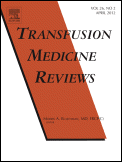
TRANSFUSION MEDICINE REVIEWS
Scope & Guideline
Unlocking insights in transfusion science.
Introduction
Aims and Scopes
- Clinical Practice in Transfusion Medicine:
The journal emphasizes evidence-based practices in transfusion medicine, addressing clinical guidelines, transfusion protocols, and best practices to optimize patient outcomes. - Emerging Infectious Diseases and Blood Safety:
A core focus is on the challenges posed by emerging infectious diseases in the context of blood transfusion, including screening methods and risk management strategies. - Transfusion-Related Complications:
Research on the prevention and management of transfusion-related complications, such as alloimmunization and transfusion reactions, is a significant area of interest. - Innovations in Transfusion Technology:
The journal highlights advancements in transfusion technologies, including novel assays, blood component processing, and storage techniques aimed at improving safety and efficacy. - Ethics and Policy in Transfusion Medicine:
There is a consistent focus on the ethical implications and policy considerations surrounding blood donation, transfusion practices, and equitable access to transfusion services. - Research Methodology and Data Analysis in Transfusion Studies:
The journal encourages methodological rigor in research related to transfusion medicine, promoting systematic reviews, meta-analyses, and innovative data analysis techniques.
Trending and Emerging
- Transfusion Practices in Trauma and Critical Care:
There is an increasing focus on the role of transfusion in trauma and critical care settings, emphasizing evidence-based practices for managing massive hemorrhage and coagulopathy. - Social Justice and Equity in Transfusion Medicine:
Recent articles have begun to explore the intersection of race, social justice, and transfusion practices, highlighting disparities in blood donation and transfusion outcomes among different populations. - Technological Innovations in Blood Component Management:
Emerging themes include the application of artificial intelligence and data analytics in optimizing blood component utilization and predicting transfusion needs. - Personalized Medicine Approaches in Transfusion:
Research is trending towards personalized transfusion strategies that consider individual patient characteristics and specific clinical scenarios, such as tailored transfusion thresholds. - Infectious Disease Surveillance and Blood Safety:
There is a notable increase in studies addressing the surveillance of transfusion-transmitted infections, particularly in response to global health crises such as the COVID-19 pandemic. - Economic Evaluations of Transfusion Practices:
Emerging research emphasizes the need for economic evaluations and cost-effectiveness analyses of transfusion strategies, reflecting a broader trend towards value-based healthcare.
Declining or Waning
- Traditional Blood Typing Techniques:
With advancements in genetic and molecular methods for blood typing, traditional serological techniques have seen a decreased emphasis, as newer technologies offer more precise and efficient alternatives. - Historical Perspectives on Transfusion Practices:
While historical analyses provided valuable insights into the development of transfusion medicine, recent publications indicate a declining trend in this area, as the focus shifts towards contemporary issues and future directions. - Generalized Studies on Blood Donation Motivation:
Although foundational research on donor motivation is important, there has been a noticeable reduction in more generalized studies, with a growing emphasis on specific demographics and targeted donor recruitment strategies. - Broad Reviews of Transfusion Safety Practices:
The journal has moved away from broad, generalized reviews of transfusion safety practices, favoring more specific analyses that address current challenges and innovative solutions in transfusion safety.
Similar Journals
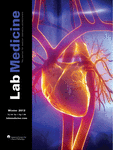
AMERICAN JOURNAL OF CLINICAL PATHOLOGY
Your Essential Resource for Clinical Pathology InsightsThe American Journal of Clinical Pathology, published by Oxford University Press Inc, stands as a vital resource in the fields of pathology and clinical medicine. With a rich history dating back to 1945 and an impressive impact factor reflected in its Q1 ranking in Pathology and Forensic Medicine, this journal serves as a cornerstone for researchers and professionals seeking to advance their knowledge and practice. Covering a breadth of topics within the discipline, it is recognized in 2023 as ranked #24 out of 208 in its category, highlighting its esteemed reputation within the scientific community. Although the journal does not currently offer open access, its rigorous peer-reviewed articles and cutting-edge research make it an essential addition to any academic or clinical library. The ISSN for print version is 0002-9173, with an E-ISSN of 1943-7722 available for digital access. Researchers, students, and practitioners alike will benefit from its comprehensive scope and commitment to disseminating high-quality scientific inquiry.
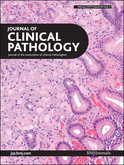
JOURNAL OF CLINICAL PATHOLOGY
Innovating Pathology for Better Health OutcomesJOURNAL OF CLINICAL PATHOLOGY, published by BMJ PUBLISHING GROUP, stands at the forefront of advancements in the field of clinical pathology, offering a platform for groundbreaking research and insights from 1948 to the present. With an impressive impact factor and categorized as Q1 in both Medicine (miscellaneous) and Pathology and Forensic Medicine for 2023, the journal holds a distinguished position in the academic community, ranking 22nd out of 208 journals in its category on Scopus and representing the 89th percentile. While the journal does not currently offer open access, it remains a vital resource for researchers, healthcare professionals, and students seeking to stay current with innovative methodologies, clinical techniques, and diagnostic advancements. Located in London, United Kingdom, the journal aims to bridge the gap between laboratory findings and clinical practice, emphasizing the importance of evidence-based pathology in improving patient care and treatment outcomes. Engage with the JOURNAL OF CLINICAL PATHOLOGY to enhance your understanding and contribute to the evolving landscape of clinical pathology research.

GEMATOLOGIYA I TRANSFUZIOLOGIYA
Connecting Scholars to the Heart of Medical ScienceGEMATOLOGIYA I TRANSFUZIOLOGIYA is an esteemed journal published by the MINISTERSTVO ZDRAVOOKHRANENIYA in the Russian Federation, focusing on the vital fields of hematology and transfusion medicine. With a rich history dating back to its inception in 1983, the journal plays a significant role in disseminating critical research and advancements in these areas, particularly relevant given the evolving landscape of medical science. As a recognized publication, it is indexed in Scopus and holds a Q4 category ranking in Hematology for 2023, reflecting its niche but important contributions to the field. Researchers, healthcare professionals, and students can look forward to a variety of peer-reviewed articles that not only address contemporary issues but also pave the way for innovative practices in hematology. Although it does not currently offer open access, the journal remains a valuable resource for those seeking to stay informed about the latest findings and developments.
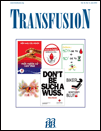
TRANSFUSION
Advancing the Science of Blood and BeyondTRANSFUSION is a prestigious peer-reviewed journal published by WILEY, dedicated to advancing the field of hematology and transfusion medicine. With an ISSN of 0041-1132 and an E-ISSN of 1537-2995, this journal serves as a vital resource for researchers and professionals alike, delivering high-quality studies and reviews that impact clinical practice and blood management strategies. The journal enjoys a strong reputation, evidenced by its impressive Q1 ranking in hematology and Q2 in both immunology and allergy as of 2023. Covering foundational aspects from 1958 to 2024, TRANSFUSION not only provides valuable insights but also fosters collaboration and innovation in understanding the complexities of blood donation, transfusion practices, and immunological responses. With its significant contributions to the scientific community, this journal is essential for those seeking to stay at the forefront of research and advancements in transfusion science.
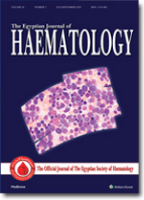
Egyptian Journal of Haematology
Pioneering Knowledge in Hematologic Malignancies and CareThe Egyptian Journal of Haematology, published by WOLTERS KLUWER MEDKNOW PUBLICATIONS, stands as a pivotal resource in the field of hematology, particularly within the context of Egypt and the broader Middle Eastern region. This journal is dedicated to disseminating high-quality research that explores the latest advancements in blood disorders, hematologic malignancies, and transfusion medicine. With a focus on original research, case studies, and reviews, it aims to provide a comprehensive platform for hematologists, researchers, and healthcare professionals to enhance their understanding and management of hematological conditions. Although it is not an open-access journal, the rigorous peer-review process ensures that only the most impactful studies are published, contributing to the journal's reputation in the academic community. The Egyptian Journal of Haematology serves as an essential tool for advancing knowledge, improving clinical outcomes, and fostering collaboration among experts in the field.
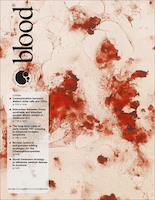
BLOOD
Pioneering Research at the Heart of Hematology.BLOOD, published by the American Society of Hematology, is a premier peer-reviewed journal in the fields of Biochemistry, Cell Biology, Hematology, and Immunology. With an impressive impact factor and ranking in the top quartiles (Q1) across multiple disciplines, BLOOD is essential reading for researchers and professionals seeking to stay updated on the latest advancements in hematology and related fields. The journal has been a cornerstone of hematological research since its inception in 1946, providing a platform for rigorous scientific inquiry and discourse. Its commitment to publishing high-quality original research, comprehensive reviews, and insightful editorials makes it a vital resource for students, practitioners, and scientists alike. By offering exceptional access to influential publications, BLOOD continues to shape the future of hematology and enhance understanding of blood-related disorders, marking its vital role in advancing both basic and clinical research.

Journal of Blood Medicine
Advancing Hematology: Unveiling Breakthroughs in Blood MedicineThe Journal of Blood Medicine, published by DOVE MEDICAL PRESS LTD, stands as a vital resource in the field of hematology, focusing on the latest research developments and clinical advancements in blood medicine. With an impact factor reflective of its growing relevance, this open-access journal has been delivering quality scholarly work since 2010, ensuring that critical research is readily available to the global scientific community. The journal operates under an open-access model, further enhancing its dissemination and accessibility to researchers, professionals, and students alike. In the 2023 rankings, it secured a Q3 category status within hematology and achieved a commendable 76th rank out of 137 in Scopus listings, indicating its commitment to quality and innovation in this specialized area. Located in New Zealand, the journal's diverse topics encompass clinical research, treatment modalities, and emerging therapies, contributing significant insights vital for shaping future advancements in blood medicine.
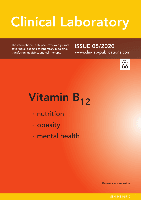
Clinical Laboratory
Pioneering Discoveries in Clinical BiochemistryClinical Laboratory is a reputable journal dedicated to the interdisciplinary field of clinical biochemistry, genetics, and molecular biology. Published by CLIN LAB PUBL in Germany, this journal provides a platform for the dissemination of original research, reviews, and key insights into laboratory practices and innovations that play a crucial role in modern medicine and diagnostics. With an ISSN of 1433-6510 and a consistent publication history since its inception in 1964 and converging through 2024, it is indexed within the Scopus database, ranking in the 30th percentile among its peers. Although classified in the third quartile for 2023 in the field, Clinical Laboratory continues to contribute valuable knowledge and fosters collaboration among researchers, professionals, and students. Notably, it does not currently operate as an Open Access journal, which emphasizes its commitment to maintaining high-quality peer-reviewed content accessible through institutional and library subscriptions. For those in the domain, Clinical Laboratory serves as a vital resource for the latest advancements and trends shaping the future of clinical laboratory science.

Journal of Hematology
Elevating Hematology Through Collaborative ResearchThe Journal of Hematology, published by ELMER PRESS INC, serves as a pivotal platform for disseminating cutting-edge research in the field of hematology. With an ISSN of 1927-1212 and an E-ISSN of 1927-1220, this journal is committed to advancing scientific knowledge and clinical practice through high-quality peer-reviewed articles encompassing all aspects of blood disorders, from basic science to health policy implications. While the journal currently operates under a traditional access model, it nonetheless prioritizes the rapid publication of significant findings, ensuring that researchers, clinicians, and students have timely access to the latest advancements in hematological research. Positioned to bridge gaps in knowledge and foster collaboration among scholars worldwide, the Journal of Hematology is an essential resource for anyone invested in this vital area of medicine.
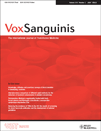
VOX SANGUINIS
Exploring the Frontiers of Blood MedicineVOX SANGUINIS is a distinguished peer-reviewed journal in the fields of Hematology and Medicine, published by Wiley, a leading academic publisher based in the United Kingdom. With a rich history dating back to its inception in 1952, this journal has consistently provided a platform for innovative research and insightful reviews, advancing the understanding of blood-related disorders and therapies. As evidenced by its robust performance—ranking #57 out of 137 in Scopus for Medicine in Hematology and holding a Q2 classification in both Hematology and miscellaneous Medicine categories—VOX SANGUINIS is recognized for its significant contributions to the scientific community. This journal serves as a vital resource for researchers, professionals, and students alike, fostering knowledge exchange and collaboration within the field. With its ongoing commitment to quality and integrity, VOX SANGUINIS continues to shape the future of hematological research well into 2024 and beyond.